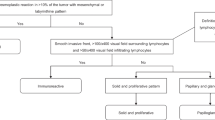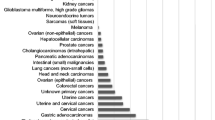Abstract
Background
The presence of estrogen receptor α (ERα) and estrogen receptor β (ERβ) have been reported in cell and tissue level in gastric cancer, but its impact on patients’ survival remains unclear. This study was designed to investigate the expression level of ERα and ERβ and to assess clinical significance of ERα and ERβ expression in gastric cancer.
Methods
The expression level of ERα and ERβ were assessed by reverse-transcriptase polymerase chain reaction (RT-PCR) in 35 surgically resected gastric cancer and corresponding normal tissues and by immunohistochemical staining in 211 surgically resected gastric cancer and match normal tissues.
Results
The expression level between ERα mRNA expression in gastric cancer tissues and match normal tissues had no statistically significant difference. The ERβ mRNA level in normal tissues was significantly higher than that observed in gastric cancer tissues (P = 0.001). Neither ERα nor ERβ mRNA expression levels had significant correlation with clinicopathologic parameters. Forty-eight of 211 (22.7%) gastric cancer tissues showed positive expression of ERα and ERβ detected in gastric cancer. ERα-positive expression correlated with poorer overall survival (P = 0.014), as did the absence of ERβ expression in patients with gastric cancer (P = 0.001). In multivariate analysis, the positive expression of ERα and the absence of ERβ were significant independent prognostic factors for overall survival (hazard ratio 2.159, P = 0.013, and hazard ratio 2.016, P = 0.025 respectively).
Conclusions
Our results indicated that ERα and ERβ were expressed in both gastric cancer and corresponding normal tissues. ERα expression and the absence of ERβ expression are associated with poor survival.



Similar content being viewed by others
References
Dicken BJ, Bigam DL, Cass C, Mackey JR, Joy AA, Hamilton SM. Gastric adenocarcinoma: review and considerations for future directions. Ann Surg. 2005;241:27–39.
Hohenberger P, Gretschel S. Gastric cancer. Lancet. 2003;362:305–15.
Enmark E, Pelto-Huikko M, Grandien K, et al. Human estrogen receptor beta-gene structure, chromosomal localization, and expression pattern. J Clin Endocrinol Metab. 1997;82:4258–65.
Nilsson S, Mäkelä S, Treuter E, et al. Mechanisms of estrogen action. Physiol Rev. 2001;81:1535–65.
Hayashi S, Yamaguchi Y. Estrogen signaling pathway and hormonal therapy. Breast Cancer. 2008;15:256–61.
Wigle DT, Turner MC, Gomes J, Parent ME. Role of hormonal and other factors in human prostate cancer. J Toxicol Environ Health B Crit Rev. 2008;11:242–59.
Shen SS, Smith CL, Hsieh JT, et al. Expression of estrogen receptors alpha and beta in bladder cancer cell lines and human bladder tumor tissue. Cancer. 2006;106:2610–16.
Nemenoff RA, Winn RA. Role of nuclear receptors in lung tumourigenesis. Eur J Cancer. 2005;41:2561–8.
Saji S, Kuroi K. Application of selective estrogen receptor modulators for breast cancer treatment according to their intrinsic nature. Breast Cancer. 2008;15:262–9.
Lewis-Wambi JS, Jordan VC. Treatment of postmenopausal breast cancer with selective estrogen receptor modulators (SERMs). Breast Dis. 2005–2006;24:93–105.
Hershberger PA, Vasquez AC, Kanterewicz B, Land S, Siegfried JM, Nichols M. Regulation of endogenous gene expression in human non-small cell lung cancer cells by estrogen receptor ligands. Cancer Res. 2005:65:1598–605.
Chandanos E, Rubio CA, Lindblad M, et al. Endogenous estrogen exposure in relation to distribution of histological type and estrogen receptors in gastric adenocarcinoma. Gastric Cancer. 2008;11:168–74.
Pricci M, Linsalata M, Russo F, et al. Effects of 17beta-estradiol administration on apoptosis and polyamine content in AGS cell line. Anticancer Res. 2001;21:3215–20.
Karat D, Brotherick I, Shenton BK, Scott D, Raimes SA, Griffin SM. Expression of oestrogen and progesterone receptors in gastric cancer: a flow cytometric study. Br J Cancer. 1999;80:1271–4.
Singh S, Poulsom R, Wright NA, Sheppard MC, Langman MJ. Differential expression of oestrogen receptor and oestrogen inducible genes in gastric mucosa and cancer. Gut. 1997;40:516–20.
Hogan AM, Collins D, Baird AW, Winter DC. Estrogen and gastrointestinal malignancy. Mol Cell Endocrinol. 2009;307:19–24.
Matsuyama S, Ohkura Y, Eguchi H, et al. Estrogen receptor beta is expressed in human stomach adenocarcinoma. J Cancer Res Clin Oncol. 2002;128:319–24.
Kojima O, Takahashi T, Kawakami S, Uehara Y, Matsui M. Localization of estrogen receptors in gastric cancer using immunohistochemical staining of monoclonal antibody. Cancer. 1991;67:2401–6.
Woo IS, Park MJ, Choi SW et al. Loss of estrogen receptor-alpha expression is associated with hypermethylation near its ATG start codon in gastric cancer cell lines. Oncol Rep. 2004;11:617–22.
Messa C, Russo F, Pricci M, Di Leo A. Epidermal growth factor and 17beta-estradiol effects on proliferation of a human gastric cancer cell line (AGS). Scand J Gastroenterol. 2000;35:753–8.
Takano N, Iizuka N, Hazama S, Yoshino S, Tangoku A, Oka M. Expression of estrogen receptor-alpha and -beta mRNAs in human gastric cancer. Cancer Lett. 2002;176:129–35.
Wang L, Jiang Z, Sui M, Shen J, Xu C, Fan W. The potential biomarkers in predicting pathologic response of breast cancer to three different chemotherapy regimens: a case control study. BMC Cancer. 2009;9:226.
Chandanos E, Lagergren J. Oestrogen and the enigmatic male predominance of gastric cancer. Eur J Cancer. 2008;44:2397–403.
Wang M, Pan JY, Song GR, Chen HB, An LJ, Qu SX. Altered expression of estrogen receptor alpha and beta in advanced gastric adenocarcinoma: correlation with prothymosin alpha and clinicopathological parameters. Eur J Surg Oncol. 2007;33:195–201.
Oshima CT, Wonraht DR, Catarino RM, Mattos D, Forones NM. Estrogen and progesterone receptors in gastric and colorectal cancer. Hepatogastroenterology. 1999;46:3155–8.
Ding JX, Feng YJ, Yao LQ, Yu M, Jin HY, Yin LH. The reinforcement of invasion in epithelial ovarian cancer cells by 17 beta-Estradiol is associated with up-regulation of Snail. Gynecol Oncol. 2006;103:623–30.
Park SH, Cheung LW, Wong AS, Leung PC. Estrogen regulates snail and slug in the down-regulation of E-cadherin and induces metastatic potential of ovarian cancer cells through estrogen receptor alpha. Mol Endocrinol. 2008;22:2085–98.
Kousteni S, Bellido T, Plotkin LI, et al. Nongenotropic, sex-nonspecific signaling through the estrogen or androgen receptors: dissociation from transcriptional activity. Cell. 2001;104:719–30.
Paech K, Webb P, Kuiper GG, Nilsson S, Gustafsson J, Kushner PJ, Scanlan TS. Differential ligand activation of estrogen receptors ERalpha and ERbeta at AP1 sites. Science. 1997;277:1508–10.
Maruyama S, Fujimoto N, Asano K, Ito A. Suppression by estrogen receptor beta of AP-1 mediated transactivation through estrogen receptor alpha. J Steroid Biochem Mol Biol. 2001;78:177–84.
Izawa M, Inoue M, Osaki M, Ito H, Harada T, Terakawa N, Ikeguchi M. Cytochrome P450 aromatase gene (CYP19) expression in gastric cancer. Gastric Cancer. 2008;11:103–10.
Acknowledgement
Grant support: Zhejiang Science Foundation of China Y208218 (Zhinong jiang).
Author information
Authors and Affiliations
Corresponding author
Rights and permissions
About this article
Cite this article
Xu, C.Y., Guo, J.L., Jiang, Z.N. et al. Prognostic Role of Estrogen Receptor α and Estrogen Receptor β in Gastric Cancer. Ann Surg Oncol 17, 2503–2509 (2010). https://doi.org/10.1245/s10434-010-1031-2
Received:
Published:
Issue Date:
DOI: https://doi.org/10.1245/s10434-010-1031-2




